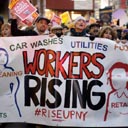
The Lost City of Solidarity
Organized labor in the United States has always been an urban institution. But new estimates of union density in American metropolitan settings show that relationship unraveling.


Organized labor in the United States has always been an urban institution. But new estimates of union density in American metropolitan settings show that relationship unraveling.

Delivering flexibility and scale at rock-bottom prices, Foxconn keeps pounding out the very real underpinnings of the New Economy, remaking global manufacturing in its own image. Foxconn stands as the archetypal industrial firm for today’s planet of slums.

Presenting our new podcast, Belabored, hosted by labor journalists Josh Eidelson and Sarah Jaffe. The inaugural episode features an interview with Chicago Teachers Union president Karen Lewis.

Despite being the “world’s manufacturer,” China has been moving toward a consumption-led economy. In this photo essay, Tong Lam looks at the consumer products and information that saturate everyday life in China.

A combination of factors in recent years has contributed to a fall in the status and material well-being of Chinese women relative to men.

Precisely ten months from today, the 2014 Winter Olympics will open in Sochi, Russia. This weekend also marks the three-year anniversary of one of WikiLeaks’s most controversial interventions: the release of a video documenting American troops in Apache helicopters gunning …

Increasingly, residents of the Chinese mainland, especially the middle-class urbanites who regularly go online, seek answers to questions like: Is it possible to be a Chinese patriot, while acknowledging one’s unhappiness with the status quo?

Guest workers are too often invisible in popular discussions of work; when they appear, it’s as outliers. But Saket Soni, who founded the National Guestworker Alliance amid the New Orleans’s post-Katrina guest worker influx, says they’re better understood as a bellwether.

Jeffrey Wasserstrom introduces a special section on China in the Spring 2013 issue: “Wherever this protean country moves next, it will be taken there not just by people whose names are widely known but by those whose dreams, desires, aspirations, and actions make up China’s 99 percent.”

Senator Tom Coburn has introduced an amendment to prohibit NSF money from funding most political science research. But not all political scientists are upset. We should take their criticisms seriously—and still oppose the amendment.

In her time at Facebook, Losse saw the ideas behind Lean In take root. The book’s goals become legible when understood to be as informed by Silicon Valley business tactics as by feminism. What exactly are we leaning into?

Marshall Sahlins has resigned from the National Academy of Sciences in political and academic protest. His motivations lead to some big questions: What is anthropology? What is it for? And what does it mean to be human?

Forty-eight years ago tomorrow, on March 21, 1965, I was part of the Selma to Montgomery Voting Rights March. There were only 3,200 of us who started out from Brown Chapel on that bright Alabama Sunday, but as far as …

The Economist, long identified with libertarian economic ideals, lauded the “Nordic model” in a cover story last month as a “centrist” economic path for global capitalism.

Organized fast-food workers recently celebrated a tentative victory in New York. Deliverymen at four Manhattan Domino’s locations were granted leave to amend a complaint in an ongoing class-action lawsuit—a mundane but necessary step in what labor organizing has become in …